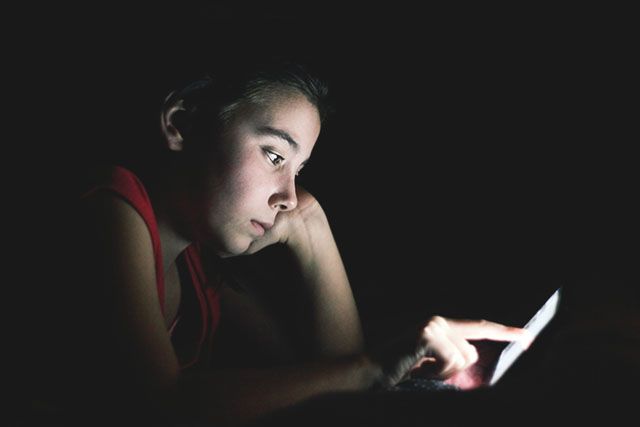
17 Mar How much screen time is too much?
Modern life demands that we are surrounded by screens and it would be next-to-impossible to complete all the tasks we need to do, at least at work, without a screen. But how do we know when we have overdosed on screens and need a break? The majority of research on excessive screen time is focused on children and young adults, however, we have also looked at adult screen use to determine the point at which both adults and children should acknowledge that they have spent too much time on screens.
When it is impacting brain function
Psychology Today say that there’s an apparent risk of subtle damage to children who engage with screens in just ‘regular’ amounts. However, the Generation M2 report says that the average child is now sitting in front of a screen for more than seven hours a day.
Practitioner Victoria Dunckley M.D. explains:
‘I observe that many of the children I see suffer from sensory overload, lack of restorative sleep, and a hyper aroused nervous system, regardless of diagnosis—what I call electronic screen syndrome. These children are impulsive, moody, and can’t pay attention.’
Shrinkage and loss of tissue in the gray matter areas of the brain, the area where cognitive processing happens, is an apparent result of screen overuse. The frontal lobe which allows you to plan, organize, prioritize and get things done is the area is that is the most primarily affected. Research also found evidence in relation to brain volume loss, which affects the striatum, the part of the brain that deals with reward pathways and suppresses socially unacceptable impulses.
Furthermore, our ability to develop empathy and compassion for others is developed in the cerebral cortex, a part of the brain known as the insula. And an alarming finding has revealed that the insula is also damaged by the overuse of screens. Not only does has a link to violence, but it can also affect the quality of personal relationships. A loss of integrity to the brain’s white matter, a reduction in cortical thickness, poor task performance and an impaired dopamine function is also a result of too much screen time.
Screen addiction, a psychological condition that is experienced by both adults and children alike, can experience restructuring of their brain. Those who aren’t classified as addicts but still use digital devices fairly heavily could also experience the restructuring of their brain.
When your eyes are feeling the strain

When we interact with digital screens, we are being exposed to a blue light that is being emitted. This blue light has many effects on us. Not only does it prevent us from sleeping – blue light suppresses the sleep-inducing hormone melatonin – but it can also cause damage to the retina.
Digital devices and screens can also cause digital eye strain and computer vision syndrome if used during long intervals. This is because people of all ages are exhausting their eyes which then causes irritation, dryness, and blurred vision. It is estimated that by 2050, half the world will need glasses because of the damage that screens have done to our eyes.
Dr. Christopher Starr, professor of ophthalmology at Weill Cornell Medical College in New York explains:
“Some of us are using these things for up to nine hours a day. Your eye muscles have to focus at that near range and that can be fatiguing. You can imagine if you were at the gym and you held a dumbbell, your bicep would be extremely sore nine hours later…. Same thing for your eyes, you have to take breaks to relieve those muscles.”
With the report from CBS came a solution. Dr. Starr suggested a rule to follow called 20-20-20. He says:
“Every 20 minutes that you’re on a computer or a mobile device, look away from the computer at an object at 20 feet away or further for 20 seconds or more. And that will let those eye muscles relax.”
If you are noticing dry, irritable and tired eyes on a frequent basis you are definitely spending too much time on digital screens.
When it is inhibiting emotional development
According to new research from the University of California in LA, children that have been spending excessive time in front of digital devices and screens could be compromising their ability to read human emotions.
The research found that a group of 11 and 12-year-olds who went five days without using any form of digital screen were much better at reading human emotion than children who had access to smartphones, television, and computers.
Although this study was related to children, as they are the ones growing up with technology, it could also impact adults too. Although there hasn’t been a similar piece of research carried out on adults, if you notice that your personal relationships are deteriorating then the time you spend on screens might be one of the first things to focus on.
So what are safe limits to set for screen time?

If overuse of screens is having a negative impact on children, and adults to some degree, is there a way of engaging with digital devices safely to prevent any of the above problems?
Psychologist Dr Sigman recommends that children under three should never watch or be in front of a screen. If they are, it should be on a rare occasion. Older children should be watching a minimum of two hours of TV a day and nothing more. He says:
“A Carry On film is probably better for your child than a lot of CBBC shows, because they lack the fast editing and bright colours that do all the damage.”
Keeping a child’s screen consumption in check is crucial in order to help with their development. Their mental and physical health could be impacted in the long term if they are spending hours in front of screens and not doing much else. And of course, exactly the same rule applies to adults too.
The key point is always that of ensuring a balanced lifestyle. If you are suffering from any of the negative effects of too much screen time (or you notice that your child is), it’s definitely time to switch off the screen and go and do something else offline instead for a while until you gain back a bit of balance.






Sorry, the comment form is closed at this time.